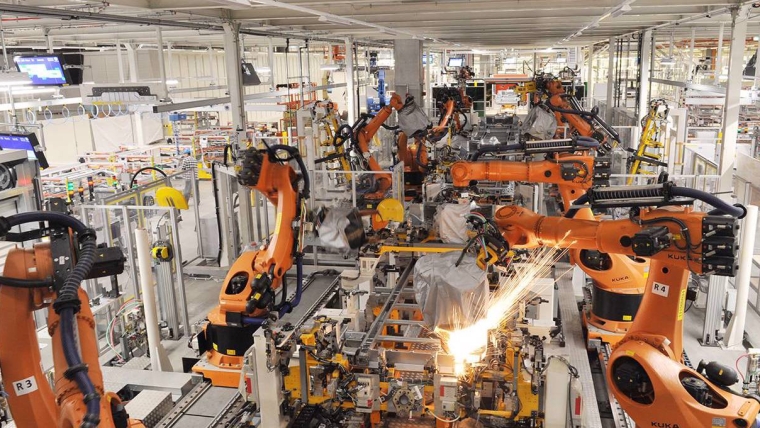
Inflation seems to be on everyone’s mind nowadays. The debate usually centers on whether America’s massive monetary and fiscal stimulus will de-anchor inflation expectations and cause prices to spin out of control. But there is another trend that could also generate inflationary pressure: deglobalisation.
Deglobalisation has been occurring since the 2008 global financial crisis. But the coronavirus pandemic has accelerated the trend significantly. Using data from the financial crisis, Kemal Kilic and I predict that the COVID-19 shock is likely to lead to a 35% decline in cross-border value chains – the main factor driving globalisation over the last three decades.
A recent survey by the Munich-based ifo Institute supports this conclusion. The study showed that about 19% of German manufacturing firms plan to reshore production. Of these, 12% will begin acquiring inputs from German suppliers, and 7% will produce them in-house.
Rising transport costs are likely to accelerate the shift away from global value chains. During the pandemic, the cost of containers used to ship goods from Asia to Europe and the United States has risen nearly tenfold, and transport workers, facing increasingly harsh working conditions, have been leaving their jobs. Overall, the price of moving goods for businesses is up to ten times higher than it was just a year ago.
These developments have diminished the profitability of global value chains significantly. Firms embraced offshoring to take advantage of far lower wages in post-communist Europe, and in China, especially after it joined the World Trade Organisation in 2001. And a revolution in the transport sector – containerisation – facilitated the process by helping to keep transport costs low enough that they didn’t offset wage differentials.
Today, those differentials are smaller, and transport costs are much higher, weakening firms’ incentive to keep their activities in far-flung locations. Moreover, onshoring (or “near-shoring”) reduces their vulnerability to global shocks.
According to Charles Goodhart and Manoj Pradhan, the resulting retreat from globalisation, together with population aging in China and the advanced economies, is a recipe for inflation. In their view, globalisation held down prices for three decades: when production moved to low-wage countries, wages everywhere were suppressed. As cheap labour becomes increasingly difficult to find, both at home and abroad, the bargaining power of labour in high-income countries will rise, compounding inflationary pressures.
Are they right? Will consumer price inflation and wages pick up after the pandemic, as the world enters a new era of deglobalisation?
The answer depends, first, on the extent to which the upheaval in the transport sector persists. If, as some observers argue, the sector is undergoing a fundamental transformation, during which costs will remain high, this could induce a wage-price spiral in rich countries, as workers seek to be compensated for rising prices.
But if firms reshore their activities, the impact of higher transport costs will be significantly diminished. Moreover, the argument that wage pressures will fuel inflation might not hold much water. After all, in many cases, firms in high-income countries can increase their use of robots, rather than hiring more expensive local workers. And, indeed, our research indicates that the reshoring of supply chains promotes the adoption of robots in high-income countries.
Robotisation will also diminish the impact of demographic trends on wages. Firms have been anticipating population aging – and the associated shrinking of the labour force – since the 1990s. And, as Daron Acemoglu and Pascual Restrepo have shown, countries undergoing faster population aging have been adopting robots at a faster pace. In Germany, one of the world’s fastest-aging societies, robots per 1,000 workers increased from under two in mid-1990 to four in 2019.
Robotisation will not only moderate labour scarcity; it might even offset it, leading to a labour surplus. As Acemoglu and Restrepo have pointed out, over the past three decades, automation has displaced far more workers than it has created new jobs. While this certainly carries risks for workers, especially those facing rising prices in advanced economies, it also suggests that deglobalisation is unlikely to fuel a surge in inflation any time soon.
Dalia Marin, Professor of International Economics at the Technical University of Munich’s School of Management, is a research fellow at the Centre for Economic Policy Research. Copyright: Project Syndicate, 2021. www.project-syndicate.org
15 Comments
As cheap labour becomes increasingly difficult to find, both at home and abroad, the bargaining power of labour in high-income countries will rise, compounding inflationary pressures.
Hnmmmm... RE USA:
We have nearly 262 million people ages 16 or older in the United States. Almost 60 percent — roughly 154 million people — are employed. That leaves us nearly 108 million on the sidelines. Of those, approximately 8 million are unemployed, defined as actively seeking employment. This translates to an unemployment rate of 4.8 percent. In South Carolina, that number looks better, at 4.2 percent.
But, as evident in this recovery, the unemployment rate tells only a part of the story. It misses the roughly 100 million individuals (about 1.8 million in South Carolina) who aren’t working and haven’t recently looked for work. Link
She goes close.
Two good reads are: The Collapse of Globalism (Saul) and From Global to Local (Livesey).
But both miss what she misses too; as we reduce energy and resource inputs, we will indeed revert to 'local'. Not because of automation, nor because the low-waged are not high-waged - but because there won't be the grunt to do the transporting.
I agree that Local and/or nomadic will definitely be the end point. But I would be interested to hear your thoughts on Timeframe, as I think this is the critical question that always remains unanswered.
Personally I see it as a few generations away yet (150-200 years). So given humanities general lack of foresight, I don't see any real liklihood of meaningful action occuring within my lifetime.
I am not saying we shouldn't act, just that I don't see us acting until the last minute.
good comment - exponential growth is the fly in your timeframe:
https://www.albartlett.org/presentations/arithmetic_population_energy.h…
Doubling-time is the problem - especially if is applying to resource depletion simultaneously. Try filling a wine bottle under a tap. You KNOW it will accelerate, you are poises to turn it off the moment you....... but it beats you every time.
He is forgetting about human nature. We will re-assess/redefine (for the record: incorrectly) areas that we currently deem protected, remote, and inaccessable.
We will ultimately destroy the planet through the extraction of resources long before we run out of said resources, and looking at how much we can still destroy we have a way to go yet.
I also wonder if we will have the grunt to mine the metals to make the robots and the power generation they need.
Once the net energy payback period has been achieved (for the solar or wind generator, and the materials), isn't a sustainably powered robot free work?
Yes, for a while. But those big blades in windfarms might last say 25 years, then we need more energy to recycle/replace. Same with solar panels, and the robots themselves, and the chips they use. How long can we build and then service complex systems like that on a scale needed for 8b+ of us as cheap oil and ores run out?
I don't really buy the "technology taking jobs and make everything efficient" argument. Actually most gains I've seen are still made by low-tech innovations like Idra Groups "Giga Press" being able to one shot die-cast half a car, saving hundreds of operations. Elon Musk said as much, early on Tesla wasted huge money trying to automate tasks that they'd have been better just hiring a person to do.
Factories have always tried to improve production efficiency from moving assembly lines to lean manufacturing processes. Automation/robotics has concurrently evolved to support that but it isn't an accelerating trend. If you look at Toyota, a company renowned for chasing efficiency, the average amount of human time to produce a Camry in the US in 1998 was 22 hours and in 2018 it was 18 hours. The main benefits to consumers have actually been product improvements like safety, reliability, fuel efficiency, lower emissions and more features.
Improvements in productivity are very hard won and it's a long game. Robots are and will be of benefit but don't expect miracles. If you ever get the chance talk to the engineers who live this every day and they'll soon dissuade you of the notion that any one technological advancement alone will move the needle on productivity.
Robotisation will not only moderate labour scarcity; it might even offset it, leading to a labour surplus.
This is so true. One day programmers will write their way out of job except for a few and AI will replace hordes of redundant Labour.
Been the dream since Gutenberg got excited about his printing press, Nartov the lathe, Arnot the drill press, Kegg the CNC machine, Engleberg the robotic arm, Hull the 3D printer etc. In reality it's just not that simple, no single advancement is sufficient alone to increase productivity substantially. It takes both innovation and enormous hard work to make small efficiencies unfortunately.
And I think one of the brakes on computer lead automation is that computers still just run on human-written code (even so called AI). If there is some kind of fundamental breakthrough to true self learning then that could take automation and robotics to a new level, but for now machines still need a 3 year old to tell them it's a cat, not a dog.
Generative design [link] is doing that with iterative processes and is starting to find some real world application. However this is not an overnight miracle, it's taken more than thirty years of hard work and still has only very limited applicability to niche scenarios.
Developing new, innovative technology is a very slow process with a long-term payoff (if it pays off at all.) Formula 1 is a great example, think about all the innovation (mid-engine cars, wings, Venturi tunnels, semi-automatic gearboxes, turbochargers, CFD, carbon fiber bodies, electronic aids, electronic suspension, KERS, ERS etc. etc. etc.) but even for a big step forwards a team would only gain a second or two per lap or less. With new technology and a massive amount of hard work you can engineer a marginal improvement.
Yip.
Quite a link, thanks, will see if I can pick through it.
"After all, in many cases, firms in high-income countries can increase their use of robots, rather than hiring more expensive local workers. And, indeed, our research indicates that the reshoring of supply chains promotes the adoption of robots in high-income countries."
Two points of relevance....
NZ is not a high income country, and more importantly most NZ business lack the scale that enables the required investment (especially with a flat to falling RE market).....and any 'reshoring' in NZ is likely to be both minimal and protracted.

We welcome your comments below. If you are not already registered, please register to comment
Remember we welcome robust, respectful and insightful debate. We don't welcome abusive or defamatory comments and will de-register those repeatedly making such comments. Our current comment policy is here.